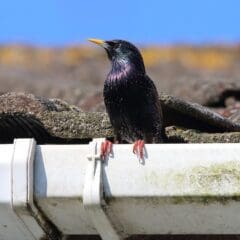In the UK, the presence of birds in our gardens brings not only beauty but also vital ecological benefits. However, when they nest in the eaves of our homes, it can pose challenges, especially concerning pest control. Yet, with the Wildlife and Countryside Act 1981 guiding our actions, we can address these issues while considering both bird protection and pest management needs.
Understanding the significance of birds in our garden ecosystems is crucial. Birds play a vital role in maintaining ecological balance by pollinating flowers, dispersing seeds, and controlling insect populations. They contribute to the health of our gardens and the broader environment, making them invaluable allies in our quest for sustainable living.
One critical aspect to consider in managing bird nesting in the eaves is timing. The optimal time to deter birds from nesting in these areas is before their breeding season begins, typically in the spring, between March and August. By acting preemptively, homeowners can implement humane pest control methods, such as installing deterrents or sealing entry points, to discourage nesting activity.
Taking such proactive measures not only helps prevent conflicts with birds but also ensures compliance with wildlife protection laws. By respecting birds’ natural behaviors and providing alternative nesting sites in our gardens, we can create spaces where they can thrive while minimising potential disruptions to our homes.
Finding the right balance between bird protection and pest control is essential for maintaining the health and biodiversity of our garden ecosystems. By embracing the positive impact of birds on nature and implementing responsible pest management practices, we can create harmonious environments where both wildlife and humans can coexist peacefully.
If your home is known to be a regular nesting site for seagulls, pigeons, starlings, house martins, or other birds every year and is causing a disturbance to your sleep or home, then get in touch. We will find a solution to help them take the necessary steps at the right time of the year to keep them coming back.

